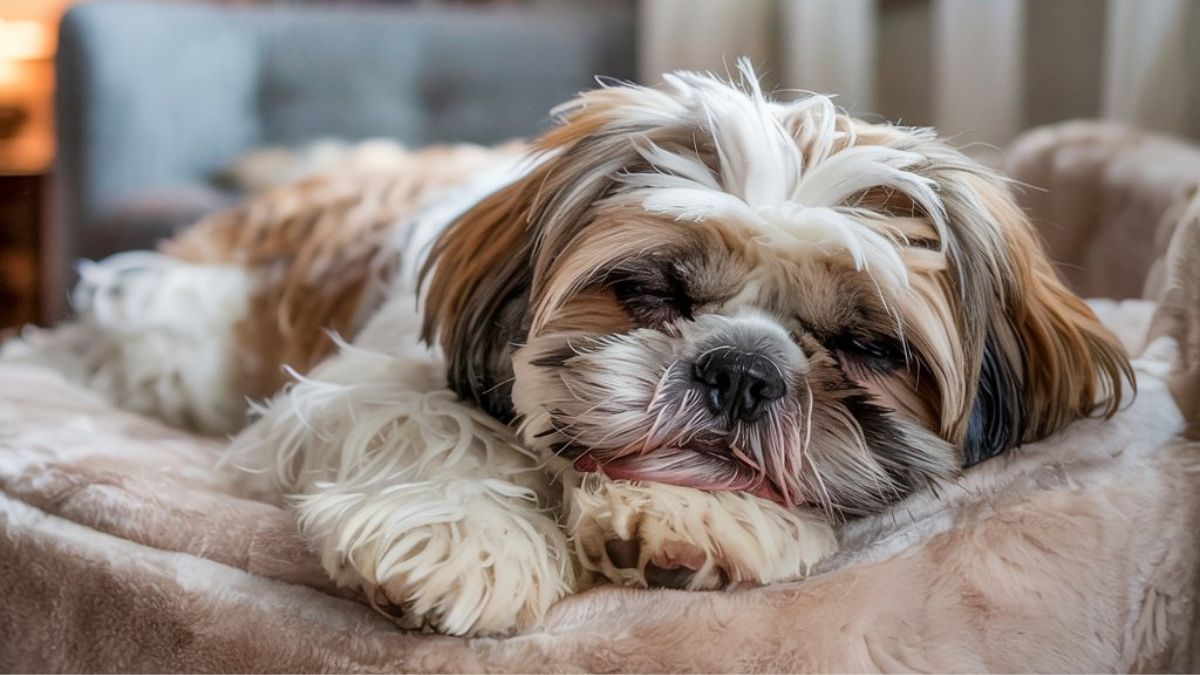Shih Tzu Breathing Problems While Sleeping: Causes & Remedies

Shih Tzus are undeniably adorable, with their flat faces, button noses, and expressive eyes. But beneath their sweet exterior lies a respiratory vulnerability common to brachycephalic (short-nosed) breeds. Many Shih Tzu owners notice their dogs snore or breathe heavily while sleeping, sometimes with signs of distress. Understanding the root of these issues is not just about comfort—it’s about ensuring your dog’s long-term health and well-being.
The Role of Brachycephalic Anatomy
Shih Tzus have a compressed facial structure that affects their airways. This flat-faced look, while cute, can result in narrower nostrils, an elongated soft palate, and a smaller-than-normal trachea. These anatomical traits can restrict airflow, particularly when the dog is lying down.
Because of this, Shih Tzus are predisposed to a condition known as Brachycephalic Obstructive Airway Syndrome (BOAS). BOAS is a collective term for various airway obstructions caused by these physical characteristics. When sleeping, especially in warm or humid environments, the airway can partially collapse or vibrate, leading to snoring, gasping, or labored breathing.
For many pet owners, the first sign of Shih Tzu Breathing Problems While Sleeping is loud, irregular snoring or sudden choking during rest.
What Sleep Apnea Looks Like in Shih Tzus
Sleep apnea in dogs isn’t talked about as much, but it’s real—especially in Shih Tzus. It typically manifests as interrupted breathing, with your dog gasping for air or suddenly waking up. These episodes may last just a few seconds, but repeated interruptions can lead to fatigue and discomfort.
Unlike humans, dogs can’t describe how they feel. So if your Shih Tzu appears tired during the day, is less playful, or starts avoiding sleep, it may be linked to poor sleep quality caused by breathing issues at night.
Snoring May Be More Than Just a Sound
Snoring is often the first sign of a problem, but not always an immediate cause for alarm. Light, rhythmic snoring can be normal in short-nosed breeds. However, if the snoring becomes louder, irregular, or accompanied by choking sounds, it may point to a more serious airway obstruction.
Chronic snoring linked to Shih Tzu Breathing Problems While Sleeping should always be monitored for underlying causes, especially if it disrupts your dog’s rest or worsens over time.
Weight and Breathing: A Heavy Burden
Obesity plays a major role in exacerbating breathing difficulties in Shih Tzus. Extra fat, particularly around the neck and chest, puts pressure on the windpipe. This increases the likelihood of airway collapse during sleep and limits the dog’s ability to breathe freely.
A few extra pounds may seem harmless, but for a small dog like a Shih Tzu, the effects are magnified. Regular weigh-ins, calorie control, and moderate activity levels are essential to keep your pet in optimal shape and reduce nighttime breathing issues.
Allergies Can Trigger Nighttime Trouble
Environmental allergens can significantly affect a Shih Tzu’s breathing, especially at night. Pollen, dust, smoke, mold, and even household cleaning sprays can irritate their sensitive nasal passages. This results in congestion, wheezing, or blocked airflow while they sleep.
Using an air purifier and switching to hypoallergenic cleaning supplies can ease symptoms. Also, be mindful of seasonal changes. In spring and autumn, when allergens are high, symptoms may worsen and affect your dog’s sleep quality.
Choosing the Right Bed Matters
A Shih Tzu’s sleep position can either help or hinder their breathing. Flat beds or surfaces that cause the head to fall backward can increase the risk of airway obstruction. Beds that provide neck and head elevation can offer some relief.
Look for orthopedic or memory foam dog beds that support the body evenly and raise the head slightly. Some Shih Tzus prefer to sleep on their side or even upright. Observe what makes your dog most comfortable and adjust accordingly.
How to Know When It’s Serious
Not all breathing noises are emergencies, but knowing the warning signs is crucial. If your dog has blue or grayish gums, struggles to breathe even while awake, or collapses during exertion, seek veterinary help immediately. These are signs that your dog is not getting enough oxygen and could be in danger.
Shih Tzu Breathing Problems While Sleeping that escalate to physical distress, panic during rest, or erratic breathing should never be left unaddressed.
Daily Habits That Make a Difference
Small lifestyle changes can dramatically improve your Shih Tzu’s breathing at night. Begin with regular brushing to avoid fur buildup around the nose. Avoid feeding your dog right before bedtime, as a full stomach can press on the diaphragm and restrict breathing.
Moderate, consistent exercise helps maintain a healthy weight without overexerting your dog. Keep walks short during hot or humid days, and avoid rough play that could stress the respiratory system.
Medical Help and Treatment Options
If lifestyle changes aren’t enough, your vet may recommend further diagnostics. In some cases, surgery is the best course of action. Procedures like widening the nostrils (nares resection) or shortening the soft palate can significantly improve airflow.
These surgeries are safe when performed by an experienced veterinary surgeon. Post-operative care usually includes anti-inflammatory medication, a short period of rest, and diet adjustments.
Non-invasive treatments may also help. These include steroid sprays, oxygen therapy, or temporary use of antihistamines if allergies are involved.
Keeping the Sleeping Area Clean and Comfortable
Your dog’s sleep environment can either help or worsen their breathing. Use a vacuum with a HEPA filter to reduce allergens in the air. Wash bedding weekly in a fragrance-free detergent. Avoid using candles or diffusers near their bed.
Humidifiers can also ease breathing by adding moisture to dry air, especially in winter. Make sure the room is well-ventilated and not too hot, as heat can further narrow the airways in brachycephalic breeds.
Realistic Expectations for Aging Shih Tzus
As Shih Tzus age, their breathing problems may become more pronounced. Senior dogs lose muscle tone, which affects their throat and airway function. Conditions like heart disease or collapsing trachea may also contribute to nighttime breathing issues.
Keep track of new symptoms and report any changes to your vet. Annual check-ups may need to become biannual for older dogs. Preventive care is the best way to ensure they enjoy restful, safe sleep in their later years.
Signs That Require Immediate Vet Attention
-
Gasping or choking during sleep
-
Waking up frequently with panic
-
Excessive drooling or foam around the mouth
-
Collapsed episodes or fainting
-
Persistent bluish gums or tongue
These signs suggest a lack of oxygen and could indicate an emergency. Don’t wait—take your dog to a vet or emergency clinic right away.
Let Your Shih Tzu Sleep Soundly
Breathing problems during sleep aren’t just a minor inconvenience—they’re a health warning. Whether it’s snoring, labored breathing, or full-blown sleep apnea, these signs deserve attention and care.
By addressing Shih Tzu Breathing Problems While Sleeping early on, you give your pet the gift of comfort, peace, and healthier sleep. It’s one of the most important steps you can take as a responsible dog owner.
Conclusion
The Health + Shih Tzu niche offers a goldmine of low-competition topics that pet owners are actively searching for—especially in the USA and UK markets. These article ideas focus on specific problems like breathing issues, eating habits, and skin allergies, which makes your content more targeted, trustworthy, and easy to rank.




